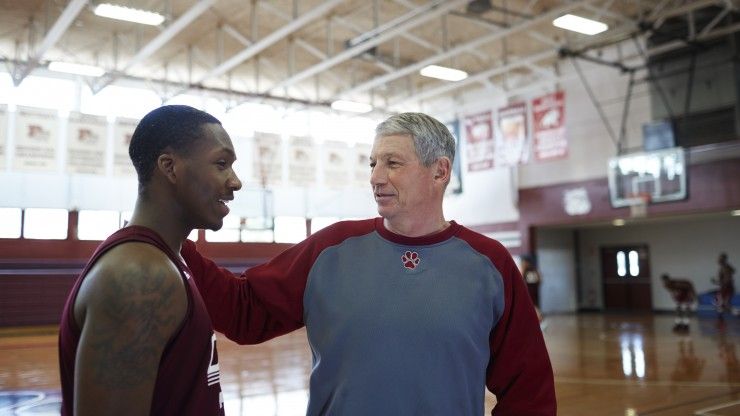
We recently hosted a webinar on how to safeguard athlete mental health during COVID-19 (if you missed it, you can watch it for free here). During the presentation, coaches like you chimed in with questions about warning signs, how to help a player who won’t admit they need assistance, and exercises to do with the whole team to destigmatize the topic. Here are Champion’s Mind creator Dr. Jim Afremow’s answers.
What are some mental health exercises I can do with my team?
A good starting point is to bring up the topic of self-care plans. In other words, what is each of your athletes intending to emphasize to be good to themselves? How do they get their mind off school and sports? What are they doing to relax, recover, and restore after a long day?
Once everyone on the team has answered these questions, ask them what some obstacles are to them implementing their self-care routines, and try and problem solve as a group. So if one athlete thinks she needs more sleep but has a noisy roommate who’s a night owl, suggest that they have a candid conversation in which your player explains her need for peace and quiet in the evening.
This kind of open-ended discussion enables everyone to learn from each other and can bring the team closer together, even if you can’t all be in the same room because of COVID-19 restrictions. If you lead the way as their coach, it shows that you care about your players as people and removes the stigma that some athletes attach to discussing their mental health.
How can I help a player who’s struggling but won’t admit that they need assistance?
They’re probably struggling with ambivalence, resistance, or reluctance to admit that they’re having a problem that they can’t solve themselves. In which case, try to find out the reason for these feelings and work through them together. What are they afraid of? It could be that they have misapprehensions, faulty assumptions, or misguided information about depression, anxiety, or another mental health challenge. For example, sometimes a player thinks that if they see a counselor or psychologist, what they say will make it back to their coaches or teammates. Reassure them that this isn’t the case and that anything they say will be in confidence.
Another common reason that a player is hesitant to get help is that they think it will be a sign of weakness. In fact, admitting that they need a helping hand is actually strong and courageous. Seeking assistance from a professional shows that an athlete is merely human and demonstrates humility. Commend them for being courageous enough to acknowledge that they’re going through a tough time and let them know that you’ll be there to support them as they take the next steps.
It will also help if you can refer them to someone who you know personally or professionally. This way you’ll be able to say something like, “She’s really nice” or “He’s the best in his field” with confidence. Your recommendation can put the player’s mind at ease that they’ll be going to see a known entity and someone who is a trustworthy expert.
What should I do if one of my players is doing mindset work and meeting with a professional but not feeling any better?
As with any other skillset, consistency is key. Encourage the athlete to become brilliant with the basics of mental skills training by doing at least a few minutes every day. They also need to commit to counseling, as it’s not going to make change overnight. I’d encourage them to stick with it for at least six months.
Then if the player still isn’t seeing positive change, suggest that they change up what they’re doing. For example, if they’re doing individual work with a psychologist, they could try group therapy instead. Or if certain mindset skills aren’t working for them, they should try exploring others (like in the Champion's Mind app) to see if they prove to be beneficial.
In the webinar you mentioned that perfectionism can be a self-limiting belief that can contribute to mental health struggles. Can you give an example of how perfectionist thinking might hold my players back?
If an athlete thinks that they can never fail without dire consequences, they’re going to tighten up and be terrified of making mistakes. This can send their anxiety level soaring. Another perfectionist thought is, “I should always feel positive, confident, and in control.” If this pandemic has shown us anything, it’s that circumstances are often outside of our influence and that it’s OK to feel unsure of what’s going to happen next.
A perfectionist might also start to believe that their worth is entirely dependent on their accomplishments on the field or in the classroom. This can start to make them overly worried about their performance and lead to them assuming that they won’t be loved or accepted unless they’re flawless. In contrast, champions know that life is not a game of perfect. That’s why heart surgeons have a saying that “the perfect stitch kills.” If they took too long with any phase of a surgery, it would put their patients at risk. They only have to be good enough to do what’s necessary, and nothing more.
One way you can help perfectionists on your team is to commend them for caring so much about the game and applaud their desire to always get better. Then remind them that you only want them to be themselves and that no matter what, that will be just what the team needs. Suggest that they give themselves some extra grace and ask them how much better they think they’d perform and feel if they lowered their expectations just a little. Encourage them to continue chasing excellence while allowing themselves to be less than perfect.
What are some warning signs that might indicate one of my players is struggling with their mental health?
If you see a dramatic personality change in one of your athletes that doesn’t seem to be just an off day, that might be cause for concern. If they slip into a performance slump or their grades take a nosedive, that can be another red flag. Outbursts of anger and aggression, lethargy, or frequent absences from practice can also be signs that something is wrong. If a player is going through an adverse life event – such as their parents’ divorcing or the death of a friend or family member – you should keep a closer eye on their mental state.
Smoking, drinking, and drug abuse are indicators that an athlete is going through an unresolved issue, and you should call them out for such behavior and offer a listening ear. If their mood seems significantly different or they’re emotionally up and down, that could be another prompt for you to intervene.
If you observe some of these warning signs, point out the behavior and ask the player what’s wrong. Offer to help in any way you can. If the issue seems more serious, refer them to a resource like a school counselor, psychologist on campus, or a professional in your community. Don’t wait until the problem gets out of hand.
Want to Improve Your Players’ Mental Health?
If you want to be proactive about safeguarding your team’s mental health, we devoted an entire module to it – along with 11 others on thriving under pressure, mental toughness, and more – in our Champion’s Mind course.
Want to see it in action? Start by telling us a bit more about your team.
Start Daily Mental Skills Training
And whether you're a coach, athlete, or parent, you can get started with daily mental skills training by downloading the Champion's Mind app for your iPhone or your Android device.
